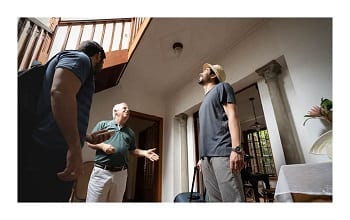How Does Listing My Home On Airbnb Affect My Tax?

Millions of Australians are now using the “sharing” economy to earn some extra money on the side.
Thanks to smartphones and user-friendly app technology, people are using peer-to-peer digital platforms to access sharing services like ride sharing, accommodation sharing, “odd jobs” networks and even pet minding.
The government is concerned that some Australians who receive income from sharing platforms may not be paying the right amount of tax – simply because they are unaware of their tax obligations.
In this article we focus on your tax obligations when earning money from a short-term residential accommodation sharing platform such as Airbnb or Stayz.
Do I have to pay tax on these amounts?
The income you earn from accommodation sharing platforms is assessable income that you must declare in your tax return. The ATO does not consider this to be “hobby” income, even if you only share your property occasionally.
You can claim deductions for relevant expenses you incur such as:
- fees or commissions charged by the digital platform;
- interest payments you make on a loan to purchase the property;
- utilities like gas and electricity;
- council rates;
- insurance premiums; and
- professional cleaning costs.
However, in many cases you will only be able to claim part of an expense. Expenses that are purely related to renting the property (e.g. platform fees) are deductible in full, but you will generally need to apportion an expense where:
- the expense also relates to private or personal use;
- the property is rented out, or is available to rent, for only part of the year; or
- you only rent out a room, rather than the whole property.
It’s a good idea to get tax advice on your deductions to ensure you are calculating your claims correctly. You also need to keep accurate records so that you can substantiate your assessable income and deductions.
Goods and services tax
Goods and services tax (GST) in the sharing economy can be confusing. The good news is that for residential accommodation, GST does not apply. This means rental payments you earn are not subject to GST, even if you also earn income from another type of sharing platform where you are required to account for GST (e.g. ride sharing, such as Uber). However, it also means you cannot claim GST credits for the GST included in the cost of your expenses.
Capital gains tax
Usually, when a taxpayer sells their main residence, they are exempt from paying any capital gains tax (CGT). However, using your residence to produce assessable income – including renting it out through the sharing economy – means you may only be entitled to a partial exemption from CGT when you eventually sell your home. The size of your exemption will depend on how long you rented out your home and the floor space that this rental activity relates to. Generally, the more often you rent out the property and the larger the proportion of floor space that is rented out, the more CGT you will have to pay (i.e. the smaller your exemption).
Unsure About Your Tax Position?
As with all rental properties, earning money through accommodation sharing sites requires careful record keeping and documentary proof. Talk to us today to make sure you are claiming all available deductions or to discuss how your main residence exemption might be affected for CGT purposes.
For expert advice and assistance in dealing with your Personal Property Tax in Australia, please contact Mathews Tax Lawyers on 1800 685 829
Disclaimer: The information on this page is for general information purposes only and is not specific to any particular person or situation. There are many factors that may affect your particular circumstances. We advise that you contact Mathews Tax Lawyers before making any decisions.
